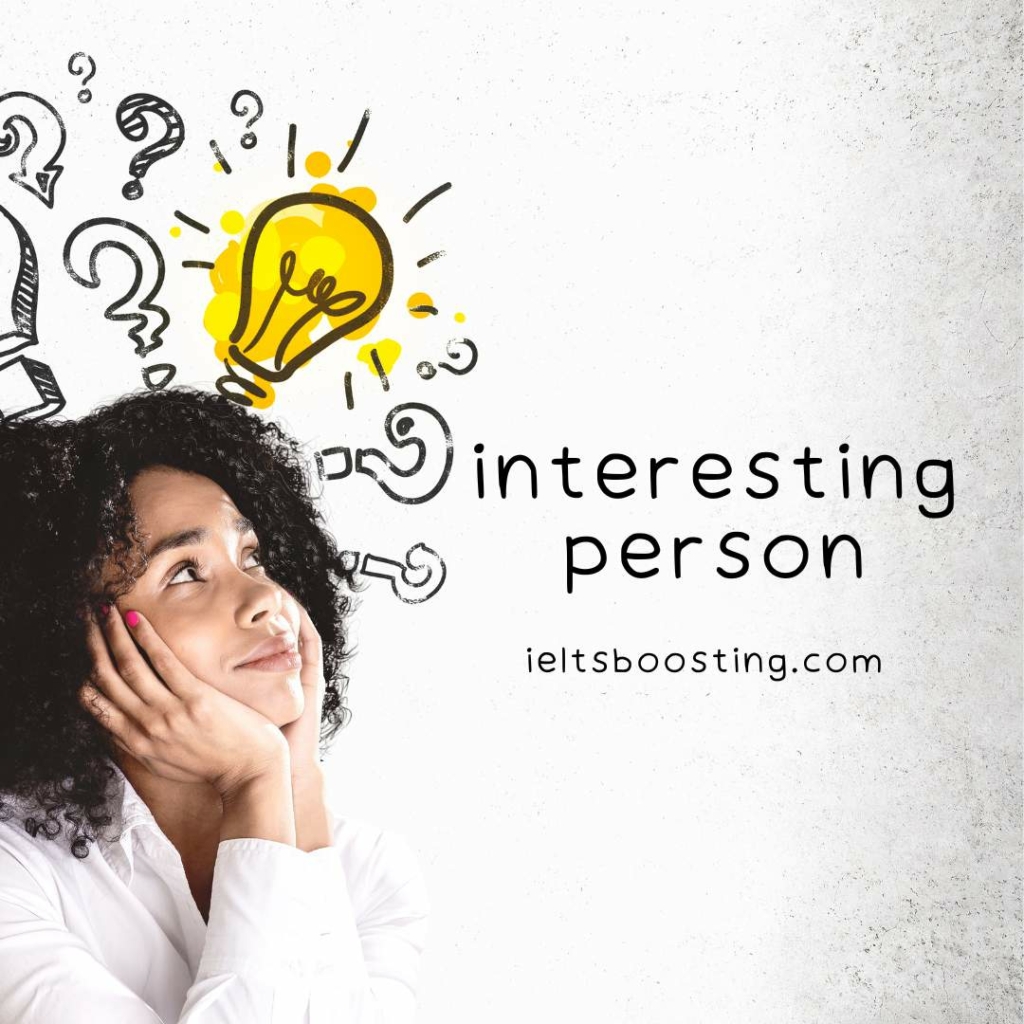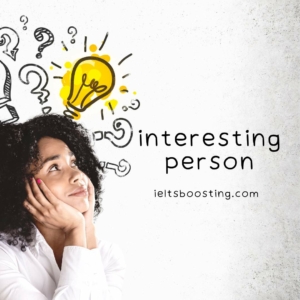Describe an interesting person you would like to meet
You should say for describe an interesting person you would like to meet
- Who this person is
- How you knew him/her
- What interesting things he/she has done
- And explain what you would like to know more about him/her
Sample answer for describe an interesting person you would like to meet
Cristiano Ronaldo is a renowned athlete who has left an everlasting mark in the world of football. His journey from humble beginnings to becoming one of the greatest football players of all time is truly inspiring.
As a big football fan, I’ve been watching the World Cup for many years. Cristiano Ronaldo’s exceptional skills have captivated me. To learn more about him, I turned to newspapers. Then, T followed his Facebook to stay updated on his achievements
One of the most interesting aspects of Cristiano Ronaldo’s life is his ongoing success at an age when many athletes start considering retirement. Instead of slowing down, he continues to excel and set new records
I’m curious about Cristiano Ronaldo’s journey to success, the discipline, and dedication that have driven him. I am particularly interested in his mindset and mental resilience. Understanding how he navigates pressure and setbacks on the field could offer valuable insights. Learning from his mental approach might provide strategies to overcome challenges and maintain focus in various aspects of life
- Renowned:Nổi tiếng Famous or well-known, especially for a positive reason.
- Everlasting:Vĩnh cửu Lasting forever or for a very long time.
- Captivate: Quyến rũ To attract and hold the interest or attention of someone.
- Admiration:Sự ngưỡng mộ A feeling of respect and approval, often mixed with awe or love.
- Discipline:Kỷ luật Control gained by enforcing obedience or order.
- Resilience: Sự phục hồi The ability to recover quickly from difficulties or setbacks.
- Excel:Xuất sắc To be exceptionally good at or proficient in an activity or subject.
- Mindset: Tư duy A person’s way of thinking and their opinions.
Explore more: ielts speaking part 2
Part 3-Describe an interesting person you would like to meet
Are there any differences in the relationship between you and your friends and between you and other people?
In terms of relationships, my interactions with friends are typically more informal and relaxed compared to my interactions with other people. For instance, with friends, we often share personal stories or inside jokes, creating a more comfortable atmosphere. On the other hand, when dealing with colleagues or acquaintances, the communication tends to be more professional. For example, in a work setting, discussions revolve around tasks and projects, maintaining a level of formality to ensure effective collaboration.
Do people feel lonely in crowded cities?
While crowded cities offer numerous opportunities for social interactions, many individuals still grapple with a sense of loneliness. The overwhelming volume of individuals surrounding them can lead to a feeling of detachment, where personal connections become scarce. For instance, in bustling metropolises like New York or Tokyo, individuals may live in close proximity but remain isolated due to busy lifestyles. Additionally, the fast-paced nature of city life may leave little time for individuals to cultivate deep relationships, further intensifying the experience of loneliness in crowded urban settings.
- Grapple – To struggle or wrestle with a difficulty or challenge.
- Overwhelming – Very intense or difficult to deal with; something that is so demanding that it exceeds one’s ability to cope or comprehend.
- Detachment – Emotional disconnection or aloofness; a state of being disinterested or uninvolved with others.
- Bustling – Full of energetic and noisy activity; busy.
- Metropolises – Large and densely populated urban areas, often significant cultural and economic centers.
- Proximity – Nearness in space, time, or relationship; closeness.
- Isolated – Being alone or set apart from others; not connected or engaged with other people.
- Cultivate – To develop or improve by care and attention; often used in the context of relationships or skills.
- Intensifying – Becoming or making more intense; increasing in strength, degree, or severity.
- Urban – Relating to a city or town; characteristic of cities.
Where and how can people get to know new people?
People can expand their social circles and meet new people through various channels. Social events, such as community gatherings or local festivals, provide excellent opportunities for individuals to connect. For example, participating in a neighborhood party fosters a sense of community and introduces people to their neighbors. Additionally, online platforms, such as Meetup or social media groups, enable individuals with shared interests to connect virtually and then potentially meet in person. Joining clubs or classes, like a cooking or language class, offers a structured environment for people to interact and form new friendships.
- Expand – To increase the size, volume, quantity, or scope of something; to spread out or broaden.
- Social Circles – The groups of people with whom one regularly associates or has social interactions.
- Channels – Means or pathways through which something is communicated or achieved.
- Community Gatherings – Meetings or assemblies of people from a particular area or group, often for social, cultural, or political purposes.
- Festivals – Events, often regularly held, celebrating a particular theme or subject, typically involving entertainment and cultural activities.
- Fosters – Encourages or promotes the development of something, typically something positive.
- Platforms – Here, it refers to digital or online services used for communication, social networking, or other interactive purposes.
- Structured Environment – A setting or situation that is organized in a specific and often formal way, with clear rules or patterns.
- Interact – To communicate or engage with others.
Can clothing tell and reveal a person’s personality?
Clothing can indeed serve as a means of expressing and revealing a person’s personality. For instance, someone who prefers vibrant and colorful attire may be perceived as outgoing and lively, showcasing their extroverted nature. Conversely, an individual who opts for more subdued and minimalist clothing might be seen as reserved or introverted. Moreover, the choice of clothing can reflect cultural influences and personal values, providing observers with insights into a person’s background and beliefs.
- Perceived – Regarded in a certain way; interpreted or understood from a particular viewpoint.
- Outgoing – Sociable and inclined to seek the company of others; extroverted.
- Lively – Full of life and energy; active and spirited.
- Extroverted – Outgoing and socially confident; characterized by an interest in other people and the external environment.
- Conversely – Introducing a statement or idea that reverses one that has just been made or referred to.
- Subdued – Quiet and rather reflective or depressed; understated in style or color.
- Minimalist – Involving the use of the simplest and fewest elements to achieve maximum effect, especially in art, design, and fashion.
- Cultural Influences – The impact of a particular culture on someone’s behavior, beliefs, and preferences.
- Personal Values – Individual principles or standards of behavior; one’s judgment of what is important in life.
Why do individuals from the same family have different personalities?
Despite sharing genetic material and a common upbringing, individuals within the same family often develop different personalities due to a combination of genetic variation and unique life experiences. Genetic diversity plays a role in shaping personality traits, as each individual inherits a distinct combination of genes from their parents. Additionally, external factors such as friendships, education, and exposure to diverse environments contribute to the development of distinct personalities. For example, siblings may attend different schools, engage in different activities, and form unique social circles, influencing their individual outlooks and behaviors.
- Genetic Material – The molecules (DNA or RNA) that carry the genetic information necessary for growth and development in all living organisms.
- Common Upbringing – The shared experience of being raised in the same environment, typically within the same family.
- Genetic Variation – Differences in DNA sequences among individuals, which contribute to the diversity of traits and characteristics in a population.
- Inherits – Receives genetic traits from parents through the process of heredity.
- External Factors – Influences or conditions that come from outside an individual, rather than from within their own genetic makeup.
- Exposure – The state of being subjected to something, such as an environment or influence, that can affect development or behavior.
- Diverse Environments – A variety of settings and circumstances that can vary widely in terms of cultural, social, and physical characteristics.
How does society influence a person’s personality?
Society plays a pivotal role in shaping an individual’s personality through cultural norms, societal expectations, and social interactions. Cultural values influence the way individuals perceive themselves and others, impacting their attitudes and behaviors. For example in japan, the emphasis on collectivism has a profound effect on personal identity. Japanese people often prioritize group cohesion and social harmony over individual expression, which can manifest in traits such as modesty, cooperation, and a strong work ethic.
- Pivotal – Of crucial importance in relation to the development or success of something else.
- Cultural Norms – The shared expectations and rules that guide behavior of people within social groups.
- Societal Expectations – The anticipated or prescribed behaviors and roles that society expects individuals to adhere to.
- Social Interactions – The ways in which people respond to one another in social situations.
- Cultural Values – The core principles and ideals upon which an entire community exists.
- Perceive – Become aware or conscious of something; come to realize or understand.
- Collectivism – The practice or principle of giving a group priority over each individual in it.
- Profound Effect – A deep, significant impact or influence.
- Personal Identity – The concept you develop about yourself that evolves over the course of your life.
- Group Cohesion – The extent to which members of a group support and validate one another while working together.
- Social Harmony – The peaceful interaction and understanding between individuals or groups in society.
- Cooperation – The process of working together to the same end.
- Work Ethic – The principle that hard work is intrinsically virtuous or worthy of reward.
Xem thêm : hacker ielts speaking


